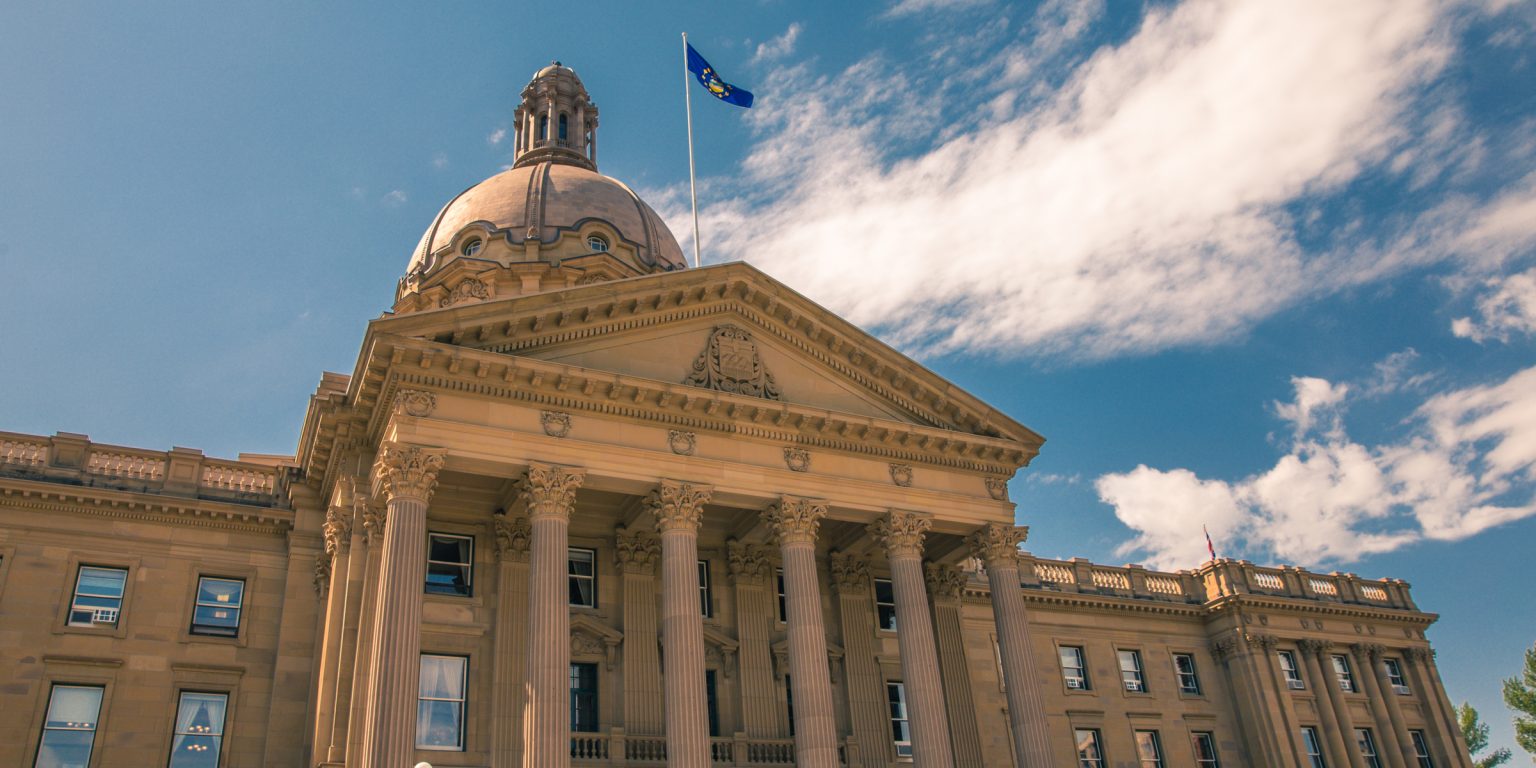Published:June 21, 2021
-Law&Liberty
For many Albertans it is 1775. A year later, as every American knows, the Declaration of Independence was signed in Philadelphia. At the time the Colonies were still part of the British Empire; it is, therefore, a British as much as an American document, which is why its logic has such a wide appeal today in the Canadian West.
All American schoolchildren know how it begins: when one people seeks to dissolve the political bonds with another, a decent respect for the opinions of humanity “requires that they should declare the causes which impel them to the separation.” It affirms that all human beings are created equal, that they have inalienable rights that governments secure and that governments derive their just power from the consent of the governed. When governments are destructive of these ends, “it is the right of the people to abolish it.” Many evils are sufferable, the Declaration continued, “but when a long train of abuses and usurpations, pursuing inevitably the same object evinces a design to reduce them under absolute despotism, it is their right, it is their duty, to throw off such a government,” and establish a new one. Such was the position of American Patriots in the Thirteen Colonies in 1776; such is the position of many Alberta Patriots today.
The Confederation of the four original colonies, now the provinces of Ontario, Quebec, Nova Scotia, and New Brunswick, occurred in 1867. To the west of the Canada of the St Lawrence river valley, which we call Laurentian Canada, lay the Hudson’s Bay Company lands, in law a plantation, with a status similar to Jamestown in seventeenth-century Virginia. In 1869 the Imperial Crown transferred this huge territory to the Crown in right of Canada. Canada indemnified the Company for “improvements” made over the previous two centuries, but it was not purchased, as Alaska was purchased from Russia.
Some Company land was given to Quebec; some to Ontario. All the rest, from the western border of Ontario to the height of the Rocky Mountains was reserved “for purposes of the Dominion,” that is, for the benefit of Laurentian Canada.
The Laurentians ignored the existence of a flourishing and, to use the language of the day, a “civilized” settlement at Red River, present-day Winnipeg. All the members of this diverse community had effectively adopted the practices of western civilization. They had not been consulted with respect to the transfer, nor did they consent to it. Canada never created anything like the Northwest Ordinance of 1789, the provisions of which enabled the orderly incorporation of the inhabitants of the American northwest into the United States. Instead, Canada used an archaic imperial statute to annex the Northwest and all its inhabitants. A long-time opponent to Company rule, Alexander Kennedy Isbister, said the territory had been degraded into a “colony of a colony.”
If the inhabitants of Red River were going to join Confederation, it would be on their own terms, as British Columbia had done. They saw themselves as vocal citizens, not mute subjects. Laurentian Canada thought otherwise, both in 1870 and fifteen years later when it deployed a military force to extinguish an armed challenge to their remote imperial rule.
The Northwest remained a colony of a colony until 1905 when two new provinces, Alberta and Saskatchewan, were created. Neither was a full-fledged province because, unlike every other province, they did not control the chief sources of revenue, namely public lands and natural resources. James Mallory once said they were provinces “in the Roman sense,” by which he meant that, like Trans-Alpine Gaul, the West would be ruled by a new Rome, Ottawa, as a conquered territory. In return, like Roman provincials, Westerners were compelled to pay tribute—taxes—to Laurentian Canada. This legal subordination lasted until 1930 when the prairie provinces were granted control of their natural resources.
Laurentian Canadians still thought the West and its resources existed to benefit them. The resources changed, from fur to wheat, potash, uranium and today: hydrocarbons. Accordingly, when the Yom Kippur war drove up the price of oil, Ottawa instituted a “made in [Laurentian] Canada” price that subsidized eastern consumers. As the federal energy minister, Marc Lalonde, helpfully explained, he wanted “to transfer wealth from Alberta to central Canada.”
Albertans have tried to work within the system. Consider Senate reform. At present all Senators are appointed by Ottawa. Alberta has 6. New Brunswick has 10. Ontario and Quebec have 24 each. Attempts by Albertans to establish an elected, equal and effective—or “triple E” Senate—have failed. The Supreme Court of Canada said change required a constitutional amendment, which effectively made any reform impossible.
A second intractable problem is official bilingualism. The policy was introduced by Pierre Trudeau in the late 1960s as a language proficiency test. It was always very much more. About 16% of Canadians are bilingual and nearly two-thirds of them have French as their first language. Nearly all are from Laurentian Canada, mostly from Quebec. About half the positions in the federal bureaucracy are designated bilingual; bilingualism is mandatory for nearly all the positions at the top, though the actual numbers are secret. What began as a policy to ensure French-speakers felt at home in Ottawa became a strategy for opposing Quebec separatists and thus promoting “national unity.” Laurentians ignore the fact that bilingualism is remote from Western historical experience, but to them bilingualism is the defining attribute of their vision of the country.
Increasing numbers of Albertans see recent efforts by Ottawa to destroy their economy as the culmination of a long train of abuses that began a century and a half ago.
Senate reform and bilingualism are just persistent annoyances. The attack on the Alberta economy and the manifest unfairness of what is called “equalization” policy are more serious. Section 36(2) of the Constitution Act (1982) established the “principle” that Ottawa would transfer money, called equalization payments, to “have-not” provinces from Canadian taxpayers living in productive ones. The goal, which is more a policy directive than a genuine principle of constitutional law, was to ensure comparable public services at comparable taxation levels.
Every Albertan knows the result. Since 1961 the net federal transfer out of the province has been $630B; today it is about $20B a year (nearly $22,000 for every family of four in the province). The net federal transfer into Quebec was $497B; today it is about $13B a year, two-thirds of every equalization dollar. When the oil industry was flourishing few Albertans complained about spreading the wealth around.
In the last decade, however, because of deliberate federal policy choices that have nearly destroyed the oil industry, acquiescence in the equalization program has changed. An already heavy regulatory burden persuaded Enbridge to cancel a proposed pipeline to the Pacific in 2015; Trans Canada abandoned its proposed pipeline to New Brunswick in 2017; Kinder Morgan gave up trying to twin its existing pipeline to Vancouver in 2018. In June of that year the Trudeau government passed Bill C-69, which further increased regulation. Albertans call C-69 the “no more pipelines” law.
In September 2019 the Trudeau government passed Bill C-48, which prohibited Canadian-based oil tankers from sailing the north coast of BC while permitting US tankers to ship Alaska crude to 17 refineries in the lower 48. The combined effect of these laws has been to ensure that any new production in Alberta will be transported by expensive and relatively dangerous rail cars, mostly to American refineries on the Gulf coast at discounted prices.
Another attack on the economy was a carbon tax. The result has been to drive investment away from Alberta to less expensive (mostly American) jurisdictions. Since 2015 about $100B in proposed capital investment has disappeared. The Alberta oil industry collapsed when business was booming in Texas and North Dakota, which is why so many Alberta companies moved south. Trans-Canada Pipelines even renamed itself TC Energy to be more at home in Texas and Mexico. Encana, which began life as the Alberta Energy Company, is now headquartered in Denver.
Increasing numbers of Albertans see recent efforts by Ottawa to destroy their economy as the culmination of a long train of abuses that began a century and a half ago. But why would Laurentian Canada kill the goose that lays the golden eggs that sustain transfer payments to Quebec? How irrational is that? This point has been made for years, most recently by Jason Kenney, premier of Alberta, when he told Yves-Francois Blanchet, leader of the Quebec separatist party that he can’t have his cake and eat it. Monsieur Blanchet replied: “you know what? I like my cake and I will do what I like about it.”
Blanchet was right. On December 7, 2018 the Premier of Quebec declared there was “no social acceptability” for a pipeline passing through Quebec. The next day the federal finance minister announced a $1.4B increase in transfer funds to Quebec. That is, Quebec was rewarded for blocking efforts of Alberta to deliver its major export to world markets. The goose that laid the golden eggs was being served up for dinner. More prosaically, Laurentians are willing to destroy the oil industry because it is based in a province of little political value to them: Alberta.
The conflict between Alberta and Laurentian Canada is not simply about economic exploitation. The histories and the mythologies of the two regions are antithetical. Laurentia has been conditioned by defeat: of the French by the English in 1759 at Quebec, of the Loyalists by the Patriots following the American Revolution.
In contrast, the settlement of the Prairie West, despite Laurentian military victory in 1885 was, at least for settlers, akin to the triumph of pioneer virtue and grit familiar to American tales about the “winning of the west.” This is why Albertans have more culturally in common with their neighbours in Montana than with fellow citizens in Ontario and Quebec.
The current Alberta government has plans to hold a referendum next fall on the continued acceptability of transfer payments. Just about everybody expects the vote to be heavily in favour of ending the policy of equalization. Then what?
Premier Kenney is of the view that such a vote will strengthen his hand in re-negotiating the program. Alberta Patriots fully expect Laurentian Canada to reject any proposals out of hand, thereby precipitating a major political crisis
Alberta’s 1776 is fast approaching. Stay tuned.




